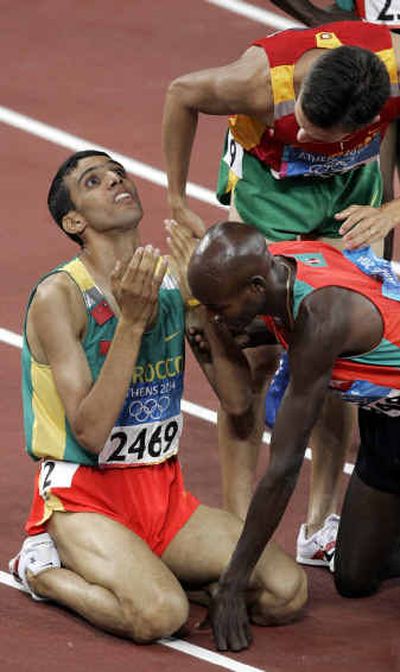El Guerrouj finally wins

ATHENS — It was the final minutes of a 14-hour day. Make that, back-to-back 14-hour days.
Roman Sebrle of the Czech Republic could sense the footsteps of his closest pursuer in the 1,500-meter race, the final event of the 10-event Olympic decathlon.
But it wasn’t the decathlete most everyone had predicted two days earlier. It wasn’t Tom Pappas, the reigning world champion, the American-born grandson of Greek immigrants.
It was Bryan Clay of tiny Keneohe, Hawaii.
Clay had pulled within 63 points of Sebrle in this marquee event to determine the world’s greatest athlete, but he couldn’t overtake the leader. He ended up with a silver medal, 73 points back.
For Clay, who won the decathlon in the U.S. Olympic trials, it was still a sweet finish. He was a virtual unknown until Tuesday night.
For Sebrle, it was his first global title even though he had held the world record since 2001.
For Pappas, it was a painful ending, even though he was nowhere to be found by the end of the night.
On a day that featured a myriad of big story lines, Pappas’s withdrawal from the decathlon because of a foot injury in the pole vault was noteworthy, but it was overshadowed by events that loomed much larger.
And for middle-distance fans, it hardly got any bigger than the sight of four-time world champion Hicham El Guerrouj pulling away from Kenyan Bernard Lagat, the former Washington Statue University runner, to win the gold medal in the men’s 1,500 meters.
El Guerrouj, from Morroco, overcame nightmare finishes from his last two Olympic Games, and when he crossed the finish line in 3:34.18, he fell to the track and cried tears of joy.
Four years ago at the Sydney Olympics, El Guerrouj had collapsed in sorrow after losing to another Kenyan, Noah Ngeny. He had called the defeat the “darkest day of my life.”
Considered one of the greatest middle-distance runners of all time, El Guerrouj had lost only three 1,500-meter races from 1996-2003 — and the 1996 and 2000 Olympics were two.
“I am like a 4- or 5-year old-child here,” said El Guerrouj, beaming. “I have seen images of glory.
“After working hard for eight years, it was a very complicated year for me. In June, I was ranked eighth, and that was not good for me, especially in an Olympic year, but I came back from very, very far down on the basis of my strong will and determination and my family.”
Lagat was gracious after the race. He knew the significance of the race for El Guerrouj. He will have another shot.
“Today was a great day,” Lagat said. “I’m happy for his gold. I’m happy for my silver.”
One race was marred by a crash and controversy at Olympic Stadium, and Americans won two medals.
Joanna Hayes won the gold medal in the women’s 100-meter hurdles in 12.37 seconds, an Olympic-record time. Ukrainian Olena Krasovska won the silver and American Melissa Morrison the bronze.
But as the three celebrated, Perdita Felicien of Canada, the world-record holder, was on the ground crying. She hit the first hurdle and took the athlete to her right, Irina Shevchenko of Russia, down with her.
“I reached for it too much,” Felicien said. “I couldn’t believe it. There was no way to come back. It’s going to take four years for it to sink in.”
It took much less than that for the Russian federation, which filed a protest less than an hour after the race. The protest was denied early this morning.
While all that was going on, Russia’s Yelena Isinbayeva won the women’s pole vault — with a world record, no less.
Isinbayeva’s jump of 16-1 1/4 was the first world record in the Olympics since Michael Johnson in the 200 meters at the 1996 Atlanta Games.
Sevetlana Feofanova, also of Russia, won the silver medal and Anna Rogowska of Poland the bronze.
Tonique Williams-Darling of the Bahamas won the women’s 400 meters in 49.41 seconds, beating Ana Guevara of Mexico by 0.15 seconds. Natalya Antyukh of Russia took the bronze.
Sebrle’s final score — 8,893 points — was an Olympic record. Clay’s 8,820 was a personal best. Dmitriy Karpov of Kazakhstan captured the bronze medal with 8,725 points.
“There’s no words to describe this,” Clay said. “Everyone has known for so long that this was a dream of mine.”
LOCAL WATCH
Whyte places sixth
Former UI track star Angela Whyte finished sixth in the 100-meter hurdle finals.
Whyte, competing for Canada, finished in a time of 12.81 seconds, the fifth-fastest time she’s ever posted.
“I could have done better but I can’t complain because I made it to the finals at the Olympics,” Whyte said. “It was a fast race and I lost my composure a little bit during the race and that might have cost me a couple hundredths.”
Joanna Hayes of the United States won the gold medal with an Olympic-record time of 12.37 seconds.
“Overall I’m pretty happy with my finish in the Olympics,” Whyte said. “My biggest goal was to make it to the finals and I did it in a personal-best time so that was great.”